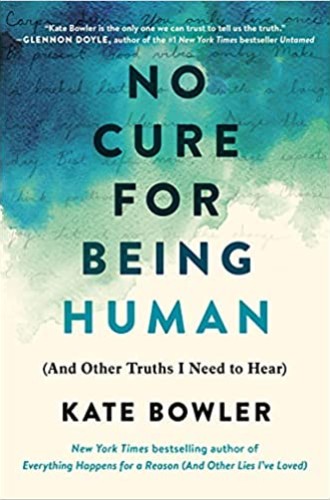Kate Bowler finds good news in hard truths
No Cure for Being Human offers a model for negotiating suffering with honesty.
Christians regularly look to Jesus as an exemplar of the good life; likewise, readers of the New Testament frequently notice how the preponderance of the Gospel stories which narrate that exemplar’s life in fact focus not on his life but on his suffering and dying. It’s curious, then, that we seldom regard Christ’s Passion as providing an example of how to face our finitude and die a good death. After all, Jesus not only forgives those who’ve wronged him and secures care for his mother, he names his grief, making audible the anguish crashing over him. By refusing the invitation to come down off his cross, Christ accepts this life as his own and, in so doing, dies to the other alternative futures otherwise available to him. In submitting to his arrest, Jesus forsakes any illusion that his life is under his control and not contingent.
Like so many who suffer illness today, Jesus finds himself at the mercy of the machinery of a bureaucracy, “made up,” as Kate Bowler puts it in her new book, “of people who must choose each and every day whether their job will require any of their humanity.” Scripture records that Jesus suffered on Calvary from noon to 3 p.m., reminding us that our lives are composed of not moments so much as minutes. None of us is getting out of life alive, yet none of us has ever before died, so none of us knows how to do it well. It’s an unexamined gift, therefore, that the one who became fully alive has shown us how to suffer and die.
Read our latest issue or browse back issues.
To recommend the Passion story as a pattern for our own suffering and dying risks exactly the sort of prescriptive, one-size-fits-all formula Bowler resists in No Cure for Being Human. She narrates her grim struggle with colon cancer with a bracing candor and a frank wit, refusing any cheap optimism or sentimentality along the way—virtues, I think, that are only intelligible in light of her Christian convictions. In so doing, she does not follow the example of Jesus so much as she incarnates it, within the uniqueness of her own circumstances.
“The truth is somewhere inside of me: there is no formula,” Bowler writes, “We live and we are loved and we are gone . . . we come undone.” That such a statement might not immediately register with us as the brave realism of a cruciform faith indicates how captured we are by the shallow pieties Bowler uses her personal narrative to expose.
Emerging from the fog of an unpromising diagnosis, Bowler, a historian at Duke Divinity School whose academic work concentrates on the prosperity gospel, discovers that the same “best life now” paradigm proclaimed by megachurches, Peloton instructors, and Burning Man can also summarize the false promises of the entire American wellness industry. No Cure for Being Human begins with a poignant vignette recalling how Bowler, gowned and tethered to an IV pole and awaiting her discharge from Duke University Hospital, starts to pull books off the shelves of the hospital gift store.
The books are all Christian best sellers promising prayerful strategies and faith-based processes by which God will reward the reader with health, wealth, and happiness. “Just let me point out the books that actively blame people for causing their own diseases,” Bowler implores the bewildered store manager.
Bowler shares this episode to critique the cultural canard that funds the “best life now” mantra. Durable illness is but an intrusive reminder of what is already true for all of us, namely, life is not bound together by infinite choices and unlimited progress. Very often what is best—or, at least, healthiest—is the recognition that this is my life now. Bowler pursues this pattern throughout the book, weaving her family’s tender but harrowing story with a church historian’s razor-sharp deconstruction of the clichés by which Culture and Christianity, Inc., encourages us to navigate our lives.
From a diagnosis that first spells doom to the glimmer of hope offered by clinical trials, in each chapter Bowler juxtaposes scenes from her “undoing” with an examination of the dialectic tension between the clichés we trade with one another—especially in moments of crisis—and the sober truths that, though often neglected and unexamined, actually mediate good news. For example, she confronts the hackneyed exhortation, “Make a bucket list!” with the helpful observation that such aspirational lists are attempts to grasp at infinity rather than embrace finitude.
Bowler upends naive catch phrases like “carpe diem” and “YOLO” with incisive, arresting reflections like, “Everybody pretends that you only die once. But that’s not true. You can die to a thousand possible futures in the course of a single, stupid life.” For every cliché Bowler encounters during her stage-serious journey, she offers a better—and, I believe, more Christian—alternative. Rather than “Make a bucket list!” she suggests in its place, “A life is never finished, even when it’s over.” Instead of the impossible-to-practice mantra “No regrets,” Bowler wisely notes, “Facing the past is part of facing the future.” As opposed to “Be present,” she reminds us, “We toggle between the past, present, and future for good reasons.”
No Cure for Being Human will prove a helpful resource for Christians, offering them the permission to negotiate suffering with an honesty God’s own suffering provides them. I think Bowler’s book also, perhaps inadvertently, displays why medicine needs the people called church.
Meeting her oncologist for the first time, a frightened Bowler attempts small talk and humorous non sequiturs with the doctor, to which the doctor does not respond. “The oncologist is probably my age,” Bowler writes. “We work at the same institution and maybe even went to the same universities. But he has perfected a disappearing act that I will come to recognize in doctors. Under his white coat, he could be anyone.” Stanley Hauerwas calls medicine a moral art. Offering presence to those under medicine’s care is a moral art, too.
As someone who also lives with an incurable cancer, I recognize the disappearing act Bowler attributes to many of her doctors. I see it in my work as a pastor, too. The result of entrusting so much of our suffering lives to modern medicine—whose goal is to eliminate suffering, not necessarily to be present with us in it—is that the ill quite often suffer their illness alone.
As an antidote to those who disappear behind professional disguises and those who offer the cold comfort of empty banalities, No Cure for Being Human demonstrates the gift God has given the world by calling forth a people capable of being a community of care, a people whose convictions about God’s abiding presence help us to know that our simple presence with those who suffer is an essential moral doing. This book can serve as a valuable tool in training such a community of care. With it, Bowler has given us something like the friend that Job, from the land of Uz, sorely needed.






